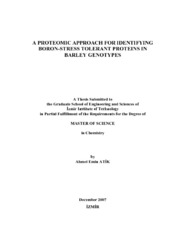Please use this identifier to cite or link to this item:
https://hdl.handle.net/11147/4001Full metadata record
| DC Field | Value | Language |
|---|---|---|
| dc.contributor.advisor | Yalçın, Talat | - |
| dc.contributor.author | Atik, Ahmet Emin | - |
| dc.date.accessioned | 2014-07-22T13:52:55Z | - |
| dc.date.available | 2014-07-22T13:52:55Z | - |
| dc.date.issued | 2008 | - |
| dc.identifier.uri | http://hdl.handle.net/11147/4001 | - |
| dc.description | Thesis (Master)--İzmir Institute of Technology, Chemistry, İzmir, 2008 | en_US |
| dc.description | Includes bibliographical references (leaves: 78-87) | en_US |
| dc.description | Text in English; Abstract: Turkish and English | en_US |
| dc.description | xi, 87 leaves | en_US |
| dc.description.abstract | Boron is an essential micro-nutrient for plants. However, when boron is present at high concentrations in the soil or ground water, healthy plant growth and development can be affected by boron toxicity. Turkey constitutes about 72 % of the total boron reserves in the world. In Turkey, barley (Hordeum vulgare) is the second widely grown cereal after wheat. Boron toxicity is one of the major factors limiting the yield of barley in Central Anatolia of Turkey. In the present study, proteomic approach was used to investigate the boronstress tolerant proteins in Anadolu barley genotype (boron-tolerant). Eight-day-old barley plants were treated with 10 mM H3BO3 for seven days. Control plants received no boron treatment during this period. Total proteins of leaves were extracted and separated by two-dimensional polyacrylamide gel electrophoresis. Control and borontreated Anadolu genotype.s proteome maps were compared and the novel proteins were fragmented into peptides using in-gel digestion technique. Liquid chromatographytandem mass spectrometry (LC-MS/MS) analysis and database searching gave way to identify ten spots representing seven different proteins. Two spots were identified as the same protein and one protein could not identified. The identified seven proteins are namely, ribulose 1,5-bisphosphate carboxylase/oxygenase large chain (RuBisCo largechain), thaumatin-like protein TLP5, basic pathogenesis-related protein PR5, RNase Slikeprotein, vacuolar proton-translocating ATPase subunit E, PSI type III chlorophyll a/b-binding protein, and light-harvesting complex I; LHC I. Among the identified seven proteins, vacuolar proton-translocating ATPase (VATPase) subunit E is the important one for boron tolerance in tolerant barley genotype. It is shown that the accumulation of excess boron in the vacuolar compartment of the plant cell by the help of V-ATPase subunit E protein. This is the known as internal tolerance mechanisms for Anadolu genotype of barley to survive under boron stress. It was proposed that, this might be the defense mechanism in boron-tolerant barley genotype under toxic boron concentrations. | en_US |
| dc.language.iso | en | en_US |
| dc.publisher | Izmir Institute of Technology | en_US |
| dc.rights | info:eu-repo/semantics/openAccess | en_US |
| dc.subject.lcc | QK753.B7 A857 2008 | en |
| dc.subject.lcsh | Plants, Effect of boron on | en |
| dc.subject.lcsh | Plant proteins--Synthesis | en |
| dc.subject.lcsh | Proteomics--Laboratory manuals | en |
| dc.subject.lcsh | Barley | en |
| dc.title | A Proteomic Approach for Indentifying Boron-Stress Tolerant Proteins in Barley Genotpes | en_US |
| dc.type | Master Thesis | en_US |
| dc.institutionauthor | Atik, Ahmet Emin | - |
| dc.department | Thesis (Master)--İzmir Institute of Technology, Chemistry | en_US |
| dc.relation.publicationcategory | Tez | en_US |
| dc.identifier.wosquality | N/A | - |
| dc.identifier.scopusquality | N/A | - |
| item.openairecristype | http://purl.org/coar/resource_type/c_18cf | - |
| item.languageiso639-1 | en | - |
| item.openairetype | Master Thesis | - |
| item.grantfulltext | open | - |
| item.fulltext | With Fulltext | - |
| item.cerifentitytype | Publications | - |
| Appears in Collections: | Master Degree / Yüksek Lisans Tezleri | |
Files in This Item:
| File | Description | Size | Format | |
|---|---|---|---|---|
| T000668.pdf | MasterThesis | 3.96 MB | Adobe PDF |  View/Open |
CORE Recommender
Page view(s)
206
checked on Mar 31, 2025
Download(s)
130
checked on Mar 31, 2025
Google ScholarTM
Check
Items in GCRIS Repository are protected by copyright, with all rights reserved, unless otherwise indicated.